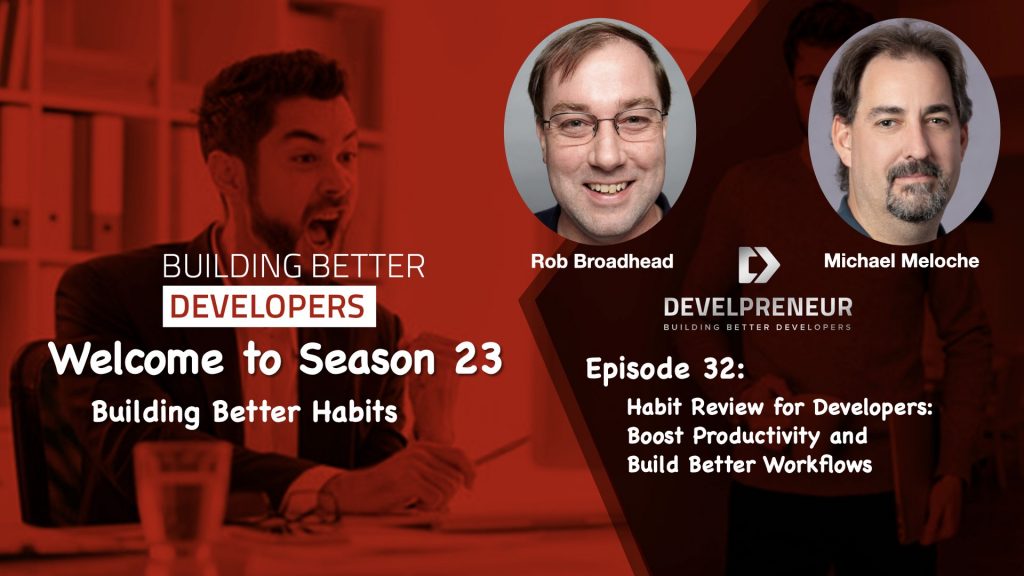As we near the end of the Building Better Developers season on habits, hosts Rob Broadhead and Michael Meloche take a moment to reflect on the journey so far. Throughout this season, they have introduced nearly 30 different habits and challenges, each designed to help developers grow both professionally and personally. In this episode, they review key takeaways, discuss the impact of these habits, and explore how to maintain long-term progress in their habit review for developers.
The Power of Habit Review for Developers
The core message of this season has been clear: habits are crucial for continuous self-improvement. Small, consistent changes add up over time, whether in development, business, or life. However, the sheer number of habits discussed can feel overwhelming. The hosts emphasize that the key is not to implement all of them at once but to focus on a few at a time, gradually integrating them into daily routines. This habit review for developers helps break down which habits have the most significant impact.
Revisiting Key Developer Habits
1. Security Awareness for Developers
One of the first habits covered in this season was security awareness. Rob reminds listeners of the importance of regular check-ins to ensure their systems remain secure. Whether updating passwords, checking for vulnerabilities, or staying informed about new cybersecurity threats, making security a habit is vital for developers. In this habit review for developers, security remains a top priority.
2. The Pomodoro Technique for Productivity
Michael and Rob discuss the effectiveness of the Pomodoro technique, a time management method that involves working in focused sprints. While Rob has successfully integrated this method into his daily workflow, Michael acknowledges that his work schedule doesn’t always allow it. This highlights an essential point—different habits work for others, and adjusting or discard those that don’t fit individual needs is okay. A habit review for developers shows which techniques offer the best productivity gains.
3. The Importance of Lists and Prioritization
Another key takeaway from this season is the value of making lists and prioritizing tasks. Michael shares how keeping a daily list of essential tasks has helped him stay productive and reduce stress. By tackling the most critical tasks early in the day—often referred to as the eat the frog method—he ensures that important work gets done before distractions arise. Developers can benefit from this habit review for developers by refining their prioritization strategies.
4. Automation and Efficiency for Developers
The hosts also revisit the topic of automation. They stress that developers should continuously look for ways to streamline repetitive tasks, freeing up time for higher-value work. With the rise of AI and automation tools, improving efficiency is more important than ever. A habit review for developers shows that automation is key to long-term efficiency.
5. Managing Anxiety and Stress in Software Development
One of the more personal topics discussed in this season was how to handle anxiety and stress. Michael emphasizes the importance of mindfulness, taking breaks, and using habits like list-making to stay on top of responsibilities. Recognizing stressors and actively working to mitigate them can make a significant difference in both professional and personal well-being. Developers can use this habit review for developers to incorporate stress management into their workflow.
Why Habit Review for Developers Matters
As the season winds down, the hosts reflect on why habits are critical. They started the season by discussing the importance of habits and want to end with a potent reminder: habits shape who we are. Developing good habits isn’t just about becoming a better developer—it’s about creating a sustainable, prosperous, and balanced life. This habit review for developers emphasizes long-term growth.
Rob and Michael acknowledge that forming new habits isn’t always easy. It requires persistence, trial and error, and a willingness to adapt. Some habits that don’t work today might be beneficial in the future, and vice versa. That’s why revisiting past habits and evaluating their effectiveness is an ongoing process, and a habit review for developers is a great way to assess progress.
Next Steps in the Developer Habit Review
For listeners who may have found the season overwhelming, the hosts recommend revisiting past episodes and choosing a few habits to implement first. Once those become second nature, it’s easier to add more. Progress is incremental, and the journey toward self-improvement is never truly complete. Performing a habit review for developers regularly helps ensure steady improvement.
As they look ahead to the next season, Rob and Michael encourage feedback from their audience. They invite listeners to share their experiences, suggest topics, and reflect on their journey toward building better habits. A structured habit review for developers can guide future growth.
Final Thoughts on Habit Review for Developers
This season has provided many strategies for improving productivity, efficiency, and well-being. Whether using the Pomodoro technique, automating tasks, prioritizing effectively, or managing stress, each habit discussed can bring positive change. The key is consistency—sticking with what works, adapting when necessary, and continuing the journey of self-improvement. A habit review for developers ensures that the proper habits are reinforced.
Stay Connected: Join the Develpreneur Community
We invite you to join our community and share your coding journey with us. Whether you’re a seasoned developer or just starting, there’s always room to learn and grow together. Contact us at [email protected] with your questions, feedback, or suggestions for future episodes. Together, let’s continue exploring the exciting world of software development.
Additional Resources
- Security Awareness: Protect Your Code, Your Career, and Your Future
- Pomodoro Technique: Boost Your Focus and Productivity with Time-Blocking
- Planning and Scheduling: Essential Habits for Building Better Developers
- Managing Anxiety and Stress: Insights and Strategies for Daily Life
- Building Better Habits Videos – With Bonus Content

